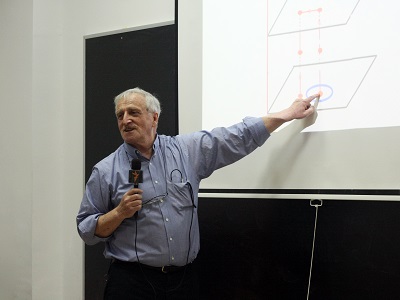Mathematics: Here, There, Every Square
- Details

On April 21, ISET hosted a public lecture by Tornike Kadeishvili, a resident professor and the head of the Scientific Board of the Andrea Razmadze Mathematical Institute. Professor Kadeishvili spoke about unexpected uses of mathematics in different fields of study, as well as how it can be applied to our everyday lives.
Professor Kadeishvili showed the audience how the human mind works when converting two-dimensional images to 3D, explaining how it is possible to trick the mind with optical illusions and then demonstrating his point using artwork by Morris Escher.
In order to explain the complicated technical details, he provided a simple story of fictional two, three, and four-dimensional worlds and issues that their inhabitants might encounter in their lives.
Public lecture on Procrastination, Academic Success and Effectiveness of a Remedial Program
- Details

On 21 April 2016, ISET hosted Maria De Paola from the University of Calabria, who presented a paper by Vincenzo Scoppa and De Paola herself, entitled 'Procrastination, Academic Success and the Effectiveness of a Remedial Program'.
According to De Paola, empirical evidence shows that individuals base very important economic decisions (such as investing in human capital, saving, and searching for a new job) on present-biased preferences. In other words, when confronted with a future investment such as studying (creating benefits in a distant future in terms of higher earnings related to better educational attainments), an individual with present-biased preferences will tend to procrastinate and delay the effort as much as possible. Sophisticated individuals – predicting their future preferences and aware of their own self-control problems – will try to use commitment devices to overcome or attenuate procrastination, whereas fully or partially naive individuals will be unable (or reluctant) to drop this habit, while incurring important welfare losses.










